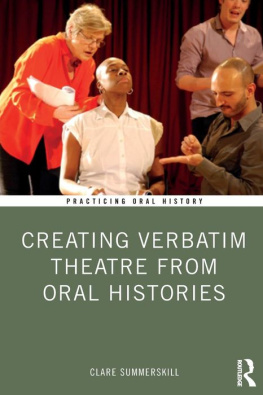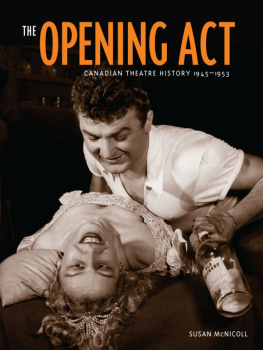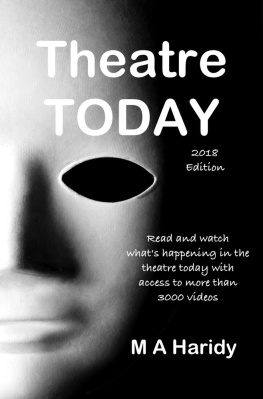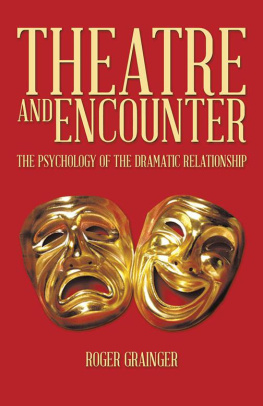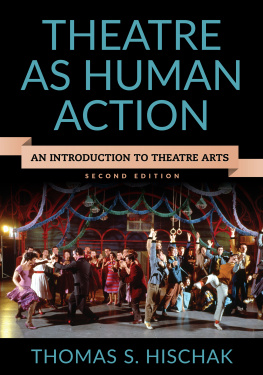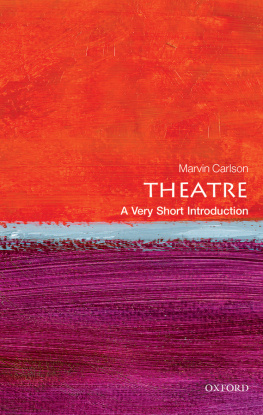THEATRE
ARTS FOR HEALTH
Series Editor: Paul Crawford, Professor of Health Humanities, University of Nottingham, UK
The Arts for Health series offers a ground-breaking set of books that guide the general public, carers and healthcare providers on how different arts can help people to stay healthy or improve their health and wellbeing.
Bringing together new information and resources underpinning the health humanities (that link health and social care disciplines with the arts and humanities), the books demonstrate the ways in which the arts offer people worldwide a kind of shadow health service a non-clinical way to maintain or improve our health and wellbeing. The books are aimed at general readers along with interested arts practitioners seeking to explore the health benefits of their work, health and social care providers and clinicians wishing to learn about the application of the arts for health, educators in arts, health and social care and organizations, carers and individuals engaged in public health or generating healthier environments. These easy-to-read, engaging short books help readers to understand the evidence about the value of arts for health and offer guidelines, case studies and resources to make use of these non-clinical routes to a better life.
Other titles in the series:
Film Steven Schlozman
Theatre Sydney Cheek-ODonnell
Singing Yoon Irons and Grenville Hancox
Music Eugene Beresin
Painting Victoria Tischler
Dancing Sara Houston
Drawing Curie Scott
Storytelling Michael Wilson
THEATRE
SYDNEY CHEEK-ODONNELL
University of Utah, United States
United Kingdom North America Japan India
Malaysia China
Emerald Publishing Limited
Howard House, Wagon Lane, Bingley BD16 1WA, UK
First edition 2021
2021 Sydney Cheek-ODonnell. Published under an exclusive license by Emerald Publishing Limited.
Reprints and permissions service
Contact:
No part of this book may be reproduced, stored in a retrieval system, transmitted in any form or by any means electronic, mechanical, photocopying, recording or otherwise without either the prior written permission of the publisher or a licence permitting restricted copying issued in the UK by The Copyright Licensing Agency and in the USA by The Copyright Clearance Center. No responsibility is accepted for the accuracy of information contained in the text, illustrations or advertisements. The opinions expressed in these chapters are not necessarily those of the Author or the publisher.
British Library Cataloguing in Publication Data
A catalogue record for this book is available from the British Library
ISBN: 978-1-83867-336-9 (Print)
ISBN: 978-1-83867-333-8 (Online)
ISBN: 978-1-83867-335-2 (Epub)
CONTENTS
About the Author
Acknowledgements
ABOUT THE AUTHOR
Sydney Cheek-ODonnell is an Associate Professor in the Department of Theatre and Associate Dean for Research in the College of Fine Arts at the University of Utah in Salt Lake City, where she teaches new play development, dramaturgy, theatre history, theory, criticism, and dramatic literature.
Currently, she works on the application of theatre techniques in non-traditional places, like healthcare settings and STEM education. She is Principle Investigator, with Dr. Gretchen A. Case, on a randomized controlled trial assessing the effectiveness of a rehearsal framework to improve the interpersonal communication skills of medical learners. This study is funded by the National Endowment for the Arts. She regularly collaborates with multidisciplinary teams at the Utah Center for Excellence in ELSI Research (UCEER) to leverage the arts particularly theatre and storytelling in the creation of education and support materials for women and families. Previously, she worked with a multidisciplinary team led by Dr. Nalini Nadkarni to explore using theatre, narrative, and ecological restoration as tools to shift the way people see themselves in relation to science, technology, engineering, and math.
She has earned PhD in Theatre History and Dramatic Criticism from the University of Washingtons School of Drama, and received her undergraduate degree from Carleton College in Minnesota.
ACKNOWLEDGEMENTS
The writing of this book would not have been possible without the support of colleagues, friends, and family, particularly in the midst of a global pandemic. I wish to thank Greg Hatch for his amazing skills as a librarian, helping me scour the literature for the evidence base of this book. We spent countless hours in parallel play, searching for sources and reading through titles, abstracts, and articles. Many thanks also to the scholars and artists who generously took the time to speak with me about their work in the field of theatre for health some of them responding to email inquiries from a total stranger. Blythe Corbett, Jacqueline Eaton, Peter Felsman, Beth Hagenlocker, and Persephone Sextou: I hope that this volume brings additional attention to your remarkable work.
Additional thanks go to my colleagues in the College of Fine Arts and the Department of Theatre at the University of Utah, who did their very best to help me carve out the time necessary for research and writing: Tim Slover, Harris Smith, John Scheib, Cami Rives, Cami Sheridan, and Aaron Swenson thank you! My deepest gratitude goes to Gretchen Case and Karly Pippitt, who offered gentle but incisive feedback on various drafts, and cheered me along at every turn. Finally, I wish to thank Nick, for providing honest feedback and running interference with our children.
INTRODUCTION WHY THEATRE?
[I]ts a ceremony, its a ritual, it is something which is very important for your mental strength, and you should go out of the theatre stronger and more human than when you went in. (Arianne Mnouchkine, Director)
In the movie Cast Away, starring Tom Hanks, FedEx systems analyst Chuck Noland is washed up alone on a desert island following a plane crash. During his four years of isolation, Chuck paints a face on a volleyball, names it Wilson, and treats it as a beloved companion. While in normal circumstances this might be seen as an indication of mental illness, in Cast Away we recognize it as a survival technique, a means for Chuck to imaginatively construct social connections where none are possible. We understand, almost instinctively, that social relationships are essential to our well-being and our survival. And when Wilson is finally lost at sea (hes on an island, so this shouldnt be much of a spoiler), we mourn with Chuck as though this now deflated, filthy volleyball were a human character. Human beings are social animals. And while it might be possible for an individual to survive in total seclusion, we know that a solitary existence is neither desirable nor healthy. In fact, loneliness is now recognized as being linked to a host of physical, mental, and cognitive challenges as well as to an increased risk of early death. So how do we foster social relationships, particularly at a time when many of us feel both extremely connected (to information) and extremely disconnected (from other people) at the same time?


